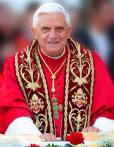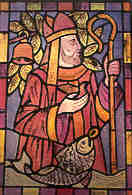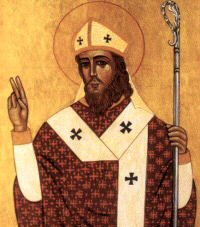 |
| Blessed Cyprian Michael Tansi, OCSO |
|
BLESSED CYPRIAN MICHAEL IWENE TANSI
(1903-1964)
|
|
|
Iwene Tansi was
born in Aguleri near Onitsha, Nigeria, in 1903. He was baptised when he was
9 years old with the Christian name, Michael. His baptism affected him
deeply even at such a young age and he shocked his non-Christian parents by
daring to destroy his own personal idol, traditionall
|
At the age of 22, after several years of working as catechist
and school teacher, he entered the seminary and was ordained a priest for the
Onitsha diocese in 1937, when he was 34. As parish priest he worked zealously
in Eastern Nigeria for 13 years, selflessly serving the religious and
material needs of his people.
|
He had to travel on
foot to visit his widely scattered parishes, would spend whole days hearing
confessions and was always available to the people in their needs, day and
night. He was particularly eager to give young people a good preparation for
marriage and to counteract the tradition of "trial marriages" which
prevailed among the pagans at that time. The large Christian populations of
many Igbo villages are a present witness to his zeal.
However, in spite of all he was doing, he felt the call to serve
God in a more direct way in a life of contemplation and prayer and, if possible
to bring the contemplative monastic life to Nigeria. In 1950 his Bishop was
able to free him to try his vocation at Mount Saint Bernard Abbey, near
Nottingham, England, and to be trained in view of founding a contemplative
monastery in the diocese of Onitsha. His new name in the monastery was Father
Cyprian. The complete change of lifestyle, particularly living under obedience
when he had been a leader of people, the change of climate, food and most of
all the culture shock were severe tests, but he was convinced that this is
where God wanted him to be. Father Mark Ulogu, who later became Abbot of
Bamenda, joined him a year later.
In 1962 Mount Saint Bernard decided to make the foundation in
Africa, but for various reasons it was made in the neighbouring country of
Cameroon, near Bamenda, rather than in Nigeria. Although he was appointed as
Novice Master of the foundation, Father Cyprian was too sick to go. He died on
January 20, 1964, a few months after the departure of the founders.

The
reputation for holiness that he had left in Nigeria before going to Mount Saint
Bernard never ceased to grow. After his death, many people claimed to have
received favours through his intercession. The process for his beatification
was opened in the diocese of Nottingham, then transferred in 1986 to the
Archdiocese of Onitsha, whose Archbishop was the present Cardinal Francis Arinze,
who had been among the first children baptised by Father Tansi when the latter
was a young parish priest. On March 22, 1998, at Onitsha, during a trip to
Nigeria made for that very purpose, Pope John Paul II beatified Father Cyprian
Michael Tansi, proclaiming him to be a model of priestly zeal and prayer.
Further references:
Fr. Gregory Wareing, A New Life
of Father Cyprian Michael Iwene Tansi (Coalville, Leicester LE6 3UL: Mt.
St. Bernard Abbey. 1994). Father Gregory was Blessed Cyprian's Novice Master.
Veronica Onyedika Chidi Umegakwe, Footprints
of Father Tansi: The Tomb is not his Goal (Awhum, Nigeria: Our Lady of
Calvary Monastery, 1993). The life of Blessed Cyprian is here presented in a
five act play by the chief coordinator of the Father Tansi Lay Contemplative
Prayer Movement.
Elisabeth Isichei, Entirely for
God. The life of Cyprian Michael Iwene Tansi (Kalamazoo: Cistercian Studies
Series 43, 1980 and 2000).
Dom John Moakler, "Some
Thoughts about Blessed Cyprian Tansi" in Hallel 25 (2000),
pp.79-93.
See also the Web Page on Blessed Cyprian Tansi, developed and
managed by Father Chidi Denis Isizoh, secretary of Cardinal Arinze at the
Pontifical Council for Dialogue with non Christian Religions www.afrikaworld.net/tansi/index.html
_______________________
___________________
For an
example of his spiritual teaching, reflecting his own spiritual experience
Excerpt from a Retreat preached by Father Cyprian
Tansi in August 1962
"We do very
little good when we embark on our own. We do much good when we allow God to
direct us and direct our enterprises. The apostles, you remember, went out
fishing, laboured the whole night and got nothing. They were on their own, the
Lord came and told them to cast the net and they would find. They did so and
were not able to draw up the net, so great was the number of fish caught. When
they worked by themselves, they took nothing. When they worked in the company of
our Lord, they were full. So with us. We must learn to avoid worrying ourselves
about things, learn to do away with anxieties of all sorts. "When you have
something to do, an assignment to perform, remembering that we are not doing
our work, but God's work, we must first go to our Lord in the Blessed
Sacrament, place our plans before Him and ask for his advice and assistance. We
must examine before him how he would like us to produce, whether he would like
us to do one thing or the other. If any doubt, consult your spiritual director
for advice. You should never undertake to do anything unless you are sure that
God wants it done in the way you are planning. Above all things you should
never do your own will: you should do only what the superiors want to be done.
You should never force the superiors to yield to your will by any stratagem.
"And while doing whatever you have to do, you should do it at a pace and
speed that will allow you time continually to turn to God for guidance. Your
conversation with God should be continual. Remember that you cannot achieve
this spiritual disposition in a day. You need time, practice and patience. All
that I request you now is to examine and to see whether what you are told is
the truth. If it is, then make a resolution to continue to make effort in this
direction without minding whether you succeed or fail."
- Michael I.
Tansi, o.c.s.o., Irrational Love: Incarnation and Redemption, an
Incomprehensible Love (Onitsha, Nigeria: Archiocesan Secretariat, 1989),
p.35











.jpg)






